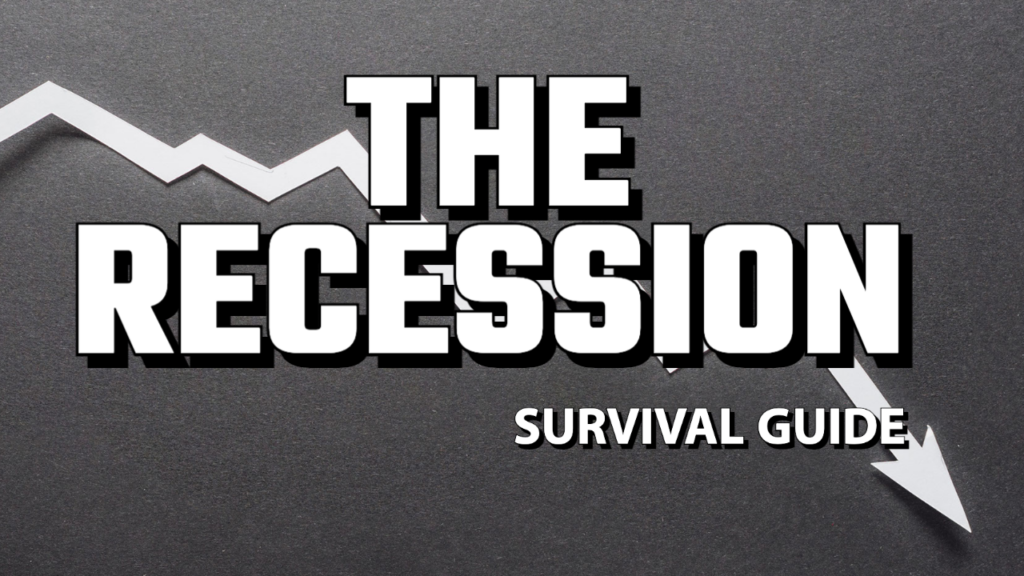Published on: 10/19/2019 • 7 min read
Recession Survival Guide


Check out the recently launched Recession Survival Guide Podcast on YouTube!
Over the years, I have written many articles on financial planning. Several of those have been “guides” to help readers through different stages of their life or lifecycle events. Two of those were the Retirement Survival Guide and Layoff Survival Guide.
Over the last year or two, I have had many friends and clients ask about the pending “recession”. Many have been waiting for the next one almost every year since the “Great Recession” of 2008. As no one knows for sure when (not if) the next recession will come, I felt that it was time to start considering writing a “Recession Survival Guide”. As I have written many of the components that I will eventually reference in that guide, I thought I would start out with this article sharing some thoughts, pointers, and guidelines that may help you find good solutions for you and your family.
The bottom line, for any risks in life you need to address, you should have a plan – don’t react. You should have an investment plan that is aligned with your financial plan to help keep you accountable and on track during any difficult market times. Once a future recession is upon us, many will react on fear which typically ends in a less than optimal solution. As a long-time financial planner, I know that having a plan in advance of any unexpected event will allow you to make optimal decisions to help keep you and your family on track to your longer-term financial goals and objectives. With that in mind, here are some thoughts and linked articles for your consideration to help you “survive” any future recession.
Recession Risks
Before you start reacting or even planning, it is good to help understand what risks and issues you must address related to a recession. Don’t just worry about whether the next recession or bear market will destroy your portfolio, have a plan and don’t make bad decisions while riding the stock market rollercoaster.
For planning pre-recession, what you should do first will partly depend on where you are in life – early career, mid-life with family, empty nesters near-retiree or retiree.
- Early Career: If you are in your early career, you would be most likely
in a place where your biggest fear will be an income interruption from a job
loss. Many issues are addressed and several solutions are discussed in
the LayoffSurvival Guide. You should also see whether your financial plan is on
track (or what it will take to get on track) regarding each stage in life – I
call it PlanningThrough Life’s Stages.
- Mid-life with Family: At this stage, while you may still
have the same concerns as #1 above, now you have more mouths to feed and
possibly have some money saved up in your 401k or savings accounts. To address
these concerns, you should also have started the financial planningprocess. It is time to have a savings plan to meet
your financial goals and that is coordinated with a thoughtful investment plan
and assetallocation.
If a recession hits and the market goes down, it could be a great time to start
“dollar cost averaging” and even save more in your retirement and/or college
savings plans.
- Empty Nesters: If you are lucky enough to have your
kids “off the payroll”, you may have fewer expenses, but you will still want to
maintain your current lifestyle and continue on the path to financial security
even in a recession. At this point, you really need to make sure that your financial
plan is more thought through and that you can now better visualize your
longer-term financial and retirement goals. Now is a great time to start “Stress
Testing”
your portfolio and your financial plan through MonteCarlo Analysis. You may also have aging parents at this point that you are
starting to worry about. Have you had the “moneytalk”
with your parents?
- Near-Retirees: At this point, your goal may be to
retire in a few years and although you want to maintain your lifestyle
pre-retirement, you need to better assure that you stay on track with your
near-term retirement goals. At this point maintaining your savings and
“retirement nest egg” may be your largest concerns. The goal at this point in
life will be having a good and disciplined investment plan to help you weather
the storm of a recession (and possible market decline). Whether a decline at
that point is short or somewhat longer than we saw in the 2000s, making
investment mistakes near retirement can easily derail your plans. So it is important to have an investment plan
you can stick to while “StayingSane in Crazy Markets”. Additionally, if you have any large positions in your
portfolio, it may also be time to create a plan to addressand hedge that portfolio concentration risk. Look at what has happened to many General
Electric retirees that held too much GE stock – many lost much of their retirement
savings due to bad planning. Also, if you are lucky enough to have a pension
plan at work, that can be a great way to generate guaranteed income in
retirement. Near retirement is a great time to make sure that you know how
to maximizethe value of your pension and align it with your retirement income plan. Bottom
line, if you haven’t read it yet, now would be a great time to read my “RetirementSurvival Guide”. In addition, if you are a business owner, you really need to
start addressing your businessexit or succession strategy. - Retirees: Once you have retired, your biggest
risk is “longevity risk” or outliving your money. If you are worried about your
retirement income stream and how much you can take out of your portfolio,
update your financial plan to determine the impact of a market decline on
your sustainableportfolio withdrawal rate that will most likely cause a pay-cut in “retirement
paycheck”. Once you are in retirement, you need to have a dependable retirement
income stream (that isn’t reliant on the market’s gains to create your needed
cash flow). You must coordinate your financial and investment plans to help
assure that you can outpace inflation and maintain your standard of living. It
is also a very good idea to have a risk management plan to protect you and your
spouse from the cash-drain of long-term care costs – possibly through long-termcare insurance
or eldercareplanning and
planning for any future incapacity. If we enter a
recession and you have not planned for these issues, the result can be even
more emotionally and financially devastating.
I hope these thoughts will help you better plan for and survive any future recession. Be on the lookout for a future “Retirement Survival Guide” from me and the planning department of Avidian Wealth.
______________________________________________________
IMPORTANT DISCLOSURES
Financial Planning and Investment Advice offered through Avidian Wealth Solutions, a registered investment advisor. Avidian Wealth Solutions does not provide tax or legal advice and the information presented here is not specific to any individual’s personal circumstances. To the extent that this material concerns tax matters or legal issues, it is not intended or written to be used, and cannot be used, by a taxpayer for the purpose of avoiding penalties that may be imposed by law. Each taxpayer should seek independent advice from a tax professional based on his or her individual circumstances. These materials are provided for general information and educational purposes based upon publicly available information from sources believed to be reliable—we cannot assure the accuracy or completeness of these materials. The information in these materials may change at any time and without notice. As always, a copy of our current written disclosure statement discussing our services and fees continues to be available for your review upon request.
Please read important disclosures here
Get Avidian's free market report in your inbox

Schedule a conversation
Curious about where you stand today? Schedule a meeting with our team and put your portfolio to the test.*